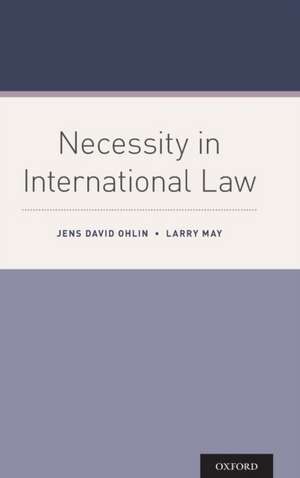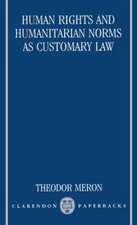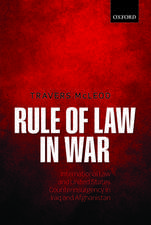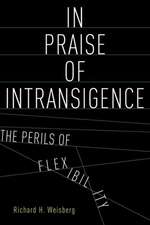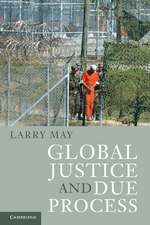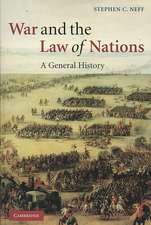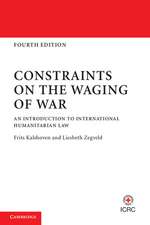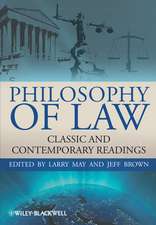Necessity in International Law
Autor Jens David Ohlin, Larry Mayen Limba Engleză Hardback – 27 oct 2016
Preț: 627.25 lei
Preț vechi: 900.72 lei
-30% Nou
Puncte Express: 941
Preț estimativ în valută:
120.02€ • 125.65$ • 99.31£
120.02€ • 125.65$ • 99.31£
Carte tipărită la comandă
Livrare economică 26 martie-01 aprilie
Preluare comenzi: 021 569.72.76
Specificații
ISBN-13: 9780190622930
ISBN-10: 0190622938
Pagini: 294
Dimensiuni: 20 x 155 x 25 mm
Greutate: 0.5 kg
Editura: Oxford University Press
Colecția OUP USA
Locul publicării:New York, United States
ISBN-10: 0190622938
Pagini: 294
Dimensiuni: 20 x 155 x 25 mm
Greutate: 0.5 kg
Editura: Oxford University Press
Colecția OUP USA
Locul publicării:New York, United States
Recenzii
this volume contains valuable insights and provocative proposals that consistently take into account integrated legal and moral considerations. Ohlin and May leave the tangled cluster of meanings of 'necessity' far clearer than they were - a major accomplishment.
The challenge that they took on was immense, and although the book occasionally betrays its origin in two distinct treatments, the result of their labor is a valuable guide to the ways in which necessity has shaped and been shaped by international law.
Jens David Ohlin's and Larry May's book provides a timely and very important analysis of one of the foundational principles of these bodies of law: necessity. [T]his impressive work provides a unique and fresh perspective. It analyzes the meaning of necessity not just in legal terms, but also deeply probes its moral and normative underpinnings. There has not been sufficient discussion about the degree to which human rights law should or can effectively regulate the violence associated with armed conflict. This work presents an important starting place for any analysis about whether human rights law is up to the task being demanded of it by some in the international legal community. This book should be required reading for anyone seeking to unravel what at times seem to have become intractable ideological debates about how the various bodies of law operate to control the use of force in contemporary conflict.
Necessity, as the authors observe in their opening sentence, is arguably the most powerful concept in the law'. It is of central importance in the law of war, in human rights law, and in both domestic and international criminal law. Yet it is a deeply confusing notion because it can function variously as a justification for harming, an excuse for having engaged in wrongful harming, and as a constraint on harmingthat is, it can defeat what would otherwise be a justification for harming. In this brilliantly illuminating book, the authors systematically untangle the many ways in which necessity operates in both morality and law, and on the basis of their analyses draw a range of conclusions of considerable significance, particularly for the practice of war. This is a book of great scholarly and practical importance.
Necessity is a slippery concept, at once enabling and limiting. Necessity justifies power but also purports to limit its employment. In their characteristic thoughtfulness and erudition, Ohlin and May explore the many uses and abuses of necessity across legal fields, including the use of force, the conduct of hostilities, human rights, and international criminal law. It is a first-of-its-kind study, topical and urgent, a must read not only for students of international law, but also for anyone interested in jurisprudence more broadly.
Much mischief is done under the cloak of necessity. This deeply interdisciplinary analysis highlights this cluster concepts dangers while imaginatively exploring its possibilities for modestly constraining the killing of combatants as well as noncombatants.
What does necessity permit? No concept in the law carries greater moral gravityand few have caused as much moral confusion. Ohlin and May offer a tour de force survey of the conceptual structure of necessity in international law. An indispensable contribution to a long-troubled problem.
Jens David Ohlin and Larry May are world-class experts in the laws of armed conflict. Here, they turn their attention to the vexed concept of necessity in wartime . . . using clear language, conceptual analysis, historical reference, and mastery of international law to get at the true sense . . . [They apply] rich reference to the most helpful historical thinkers as well as contemporary legal rulings and cases . . . One arrives at the end with a much better understanding of the idea of military necessity, and of the relevant laws.
The challenge that they took on was immense, and although the book occasionally betrays its origin in two distinct treatments, the result of their labor is a valuable guide to the ways in which necessity has shaped and been shaped by international law.
Jens David Ohlin's and Larry May's book provides a timely and very important analysis of one of the foundational principles of these bodies of law: necessity. [T]his impressive work provides a unique and fresh perspective. It analyzes the meaning of necessity not just in legal terms, but also deeply probes its moral and normative underpinnings. There has not been sufficient discussion about the degree to which human rights law should or can effectively regulate the violence associated with armed conflict. This work presents an important starting place for any analysis about whether human rights law is up to the task being demanded of it by some in the international legal community. This book should be required reading for anyone seeking to unravel what at times seem to have become intractable ideological debates about how the various bodies of law operate to control the use of force in contemporary conflict.
Necessity, as the authors observe in their opening sentence, is arguably the most powerful concept in the law'. It is of central importance in the law of war, in human rights law, and in both domestic and international criminal law. Yet it is a deeply confusing notion because it can function variously as a justification for harming, an excuse for having engaged in wrongful harming, and as a constraint on harmingthat is, it can defeat what would otherwise be a justification for harming. In this brilliantly illuminating book, the authors systematically untangle the many ways in which necessity operates in both morality and law, and on the basis of their analyses draw a range of conclusions of considerable significance, particularly for the practice of war. This is a book of great scholarly and practical importance.
Necessity is a slippery concept, at once enabling and limiting. Necessity justifies power but also purports to limit its employment. In their characteristic thoughtfulness and erudition, Ohlin and May explore the many uses and abuses of necessity across legal fields, including the use of force, the conduct of hostilities, human rights, and international criminal law. It is a first-of-its-kind study, topical and urgent, a must read not only for students of international law, but also for anyone interested in jurisprudence more broadly.
Much mischief is done under the cloak of necessity. This deeply interdisciplinary analysis highlights this cluster concepts dangers while imaginatively exploring its possibilities for modestly constraining the killing of combatants as well as noncombatants.
What does necessity permit? No concept in the law carries greater moral gravityand few have caused as much moral confusion. Ohlin and May offer a tour de force survey of the conceptual structure of necessity in international law. An indispensable contribution to a long-troubled problem.
Jens David Ohlin and Larry May are world-class experts in the laws of armed conflict. Here, they turn their attention to the vexed concept of necessity in wartime . . . using clear language, conceptual analysis, historical reference, and mastery of international law to get at the true sense . . . [They apply] rich reference to the most helpful historical thinkers as well as contemporary legal rulings and cases . . . One arrives at the end with a much better understanding of the idea of military necessity, and of the relevant laws.
Notă biografică
Jens David Ohlin is Professor of Law and Associate Dean for Academic Affairs at Cornell Law School. He specializes in international law and criminal law. He specifically focuses on the laws of war with special emphasis on the effects of new technology on the waging of warfare, including unmanned drones in the strategy of targeted killings, cyber-warfare, and the role of non-state actors in armed conflicts. He authored The Assault on International Law (Oxford, 2015).Larry May is the W. Alton Jones Professor of Philosophy, Professor of Law, and Professor of Political Science at Vanderbilt University. He has published over thirty books, including book length studies of each of the four crimes under the ICC's jurisdiction. These books have won awards in philosophy, law, and international relations. He has also published extensively on the history of the just war tradition, especially on the work of Grotius and Hobbes. He co-authored Proportionality in International Law (with Michael Newton, Oxford, 2014), and Limiting Leviathan: Hobbes on Law and International Affairs (Oxford, 2013).
